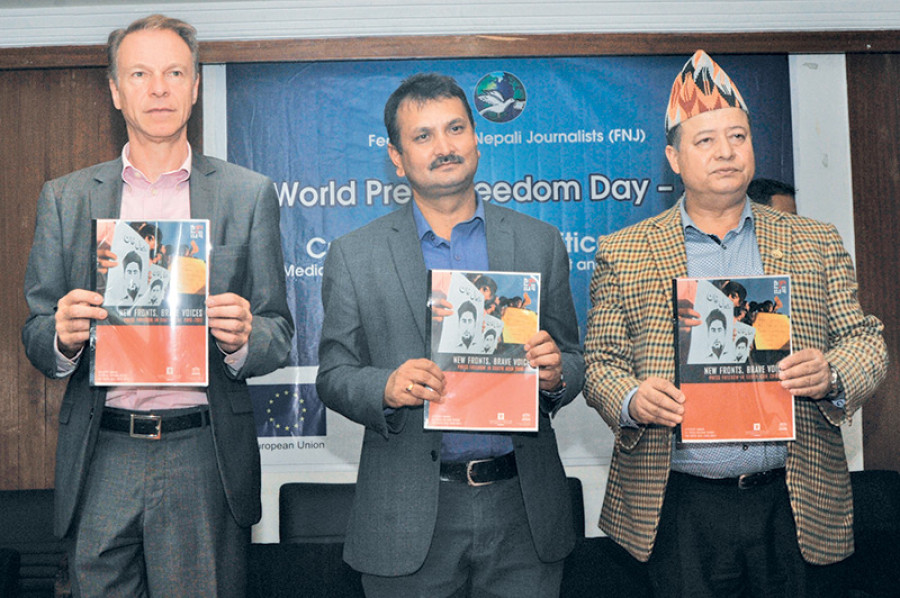National
‘Nepali media still under threat, remains unsecure’
Impunity for crimes against journalists is still a big concern for the stakeholders in Nepal, says a report released on Tuesday.
Impunity for crimes against journalists is still a big concern for the stakeholders in Nepal, says a report released on Tuesday.
The report “New Fronts, Brave Voices: Press Freedom in South Asia 2016- 2017” by the International Federation of Journalists, which was launched in the Capital by the Federation of Nepali Journalists (FNJ), in association with Unesco, says for the media in Nepal, the year was one of growing attempts by the state to exercise control, especially over the online media. “The media in Nepal continue to suffer from attacks, threats and harassment by both state and non-state parties,” it says. “The continuation of impunity surrounding crimes against journalists has not only stalled investigations into old cases of killings and disappearances of journalists, but also contributed to the increased attacks on media and journalists.”
The 15th edition of the annual report documents the deteriorating press freedom situation, media rights issues and national and regional activities to empower journalists to confront the challenges relating to press freedom of South Asia over the past year.

The FNJ has concluded that 2016 was relatively safe for the journalists in Nepal compared with the previous year, but not yet satisfactory.
“The umbrella body of Nepali journalists said that Nepali press is still under threat and remains insecure,” says the report.
There were 65 incidents of press freedom violations recorded from May, 2016 by the FNJ Media Rights Monitoring Unit.
According to the data, police detained 17 journalists while they were on assignments; 10 journalists were attacked during reporting; 15 were harassed by the different groups; seven journalists were threatened. Four of those incidents were attacks on media; two incidents were vandalising of equipment of journalists, according to the report.
Stating that Nepal continues to be in transition, the report states: “A republican constitution has been adopted with substantive guarantees for freedom of speech, but fails to attend to the complexity of ethnic aspirations in a very diverse country. That failure has stoked fresh tensions and impacted the function of media.”
“Several lacunae have emerged in the implementation of Nepal’s free speech guarantees, many of them produced by a legacy of years of conflict. Even if violence has declined, accountability for frequent acts of lethal aggression against journalists remains incomplete,” it adds.
Releasing the report, Unesco representative to Nepal, Christian Manhart, said that Nepal has well improved in press freedom and safety of journalists. “But the legacy of years of conflict remains to be settled, without which a full reconciliation seems unlikely.”
The report says though Nepal made a serious effort in bringing some conspicuous cases to trial and conviction, several instances of violence against journalists evaded scrutiny, making opportunistic use of differences of perception among the main political actors. “This creates a potential hazard of continuing violence and also endangers Nepal’s transition.”
According to UNESCO, among 35 killings of journalists in Nepal, only six were taken to prosecution.




 8.12°C Kathmandu
8.12°C Kathmandu














